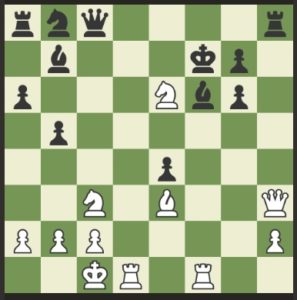
Fifty years ago, what was up in Reykjavík? Not much having to do with chess. Fischer wrote a snarky letter to the match’s arbiter Lothar Schmid, threatening not to play anymore unless his demands were met. Fischer was demanding that three more rows of seats be removed. Efrem Geller, of Spassky’s team, countered that five rows be put back. The Americans said Fischer wouldn’t play if they were put back. The Soviets said that Spassky wouldn’t play if they weren’t. The Solomonic decision was made to put the rows back but not to let anyone sit in them!
Meanwhile, white to move. Think deflection and mate in 4.

Some of you have asked for food posts. I’ve been mainly living on sandwiches these days. However, this morning I treated myself to a couple of sunny eggs and coffee from the Canons of St. John Cantius, who recently sent me a pound. Apparently, the sale of Nicaraguan beans helped the farmers built a chicken coop.

You will notice that I am using a cuillère à sauce individuelle about which I have written HERE. This is just about the perfect instrument for eggs with runny yolks. In the back ground is some of my backwardism merch, a page of the Roman Canon with the iconic phrase of Leonidas at Thermopylae in 480 BC as recounted by Herodotus: μολὼν λαβέ… molṑn labé. Literally, with that aorist participle and imperative, “having come, take!”, or, “Come and take them!”, as a defiant response to the demand of the Persian invader Xerxes that the Spartans surrender their weapons.
Speaking of backwardism, I was struck by something in the Office of Matins today that I hadn’t paid attention to over the years. In the 2nd psalm of the Office, Ps 2:
Ant. Serve ye the Lord * with fear: and rejoice unto him with trembling.
Psalm 2 [2]
2:1 Why have the Gentiles raged, * and the people devised vain things?
2:2 The kings of the earth stood up, and the princes met together, * against the Lord and against his Christ.
2:3 Let us break their bonds asunder: * and let us cast away their yoke from us.
2:4 He that dwelleth in heaven shall laugh at them: * and the Lord shall deride them.
2:5 Then shall he speak to them in his anger, * and trouble them in his rage.
2:6 But I am appointed king by him over Sion his holy mountain, * preaching his commandment.
2:7 The Lord hath said to me: * Thou art my son, this day have I begotten thee.
2:8 Ask of me, and I will give thee the Gentiles for thy inheritance, * and the utmost parts of the earth for thy possession.
2:9 Thou shalt rule them with a rod of iron, * and shalt break them in pieces like a potter’s vessel.
2:10 And now, O ye kings, understand: * receive instruction, you that judge the earth.
2:11 Serve ye the Lord with fear: * and rejoice unto him with trembling.
2:12 Embrace discipline, lest at any time the Lord be angry, * and you perish from the just way.
2:13 When his wrath shall be kindled in a short time, * blessed are all they that trust in him.
V. Glory be to the Father, and to the Son, * and to the Holy Ghost.
R. As it was in the beginning, is now, * and ever shall be, world without end. Amen.
Ant. Serve ye the Lord with fear: and rejoice unto him with trembling.
Servíte Dómino * in timóre, et exsultáte ei cum tremóre.
Ya’ll serve the Lord in fear, and, with trembling, rejoice in Him.
How perfectly this line exemplifies the dynamic of the Christian soul enveloped in the action of sacred liturgical worship.
In our Catholic worship we seek an encounter with something transformative. We are ultimately driven to seek this transformation by the growing realization of the absolute certainty of our judgment, preceded inevitably by death. Because of our baptism we can participate in the sacred mysteries, to which we are inexorably drawn in holy fear and joyful trembling, awe at transcendence, as William James would say. The more we come to our liturgical rites with full, conscious and active participation, the more we are aware of the transformative mystery we are touched by as being tremendum et fascinans, to borrow the language of Rudolph Otto, “tremble inducing and yet alluring”. This is the very stuff of religion.
I think the Vetus Ordo helps us to this point better than the Novus Ordo, particularly because the Vetus does not deemphasize the Four Last Things. It does not obscure the Passion in its emphasis on the Resurrection.
Just a rapid thought.



































I think it worth adding (probably because I like the clickety sounds it nakes when I type) that St. Augustine says in his book “On the Sermon on the Mount” that Fear of the Lord, which is one of the gifts of the Holy Ghost, corresponds to the first Beatitude, humility, and that it thus prepares us to mount up through the Beatitudes, each of which has an associated gift of the Holy Ghost, until we reach the gift of wisdom at the seventh Beatitude, where we make internal peace, the tranquility of order, and are wise since we have ordered all things with respect to God. And thus, he proves the proverb “fear of the Lord is the beginning of wisdom.”
We are constantly being robbed of this first rung of the ladder of the Beatitudes by the limp-wristed notion that humility is some abasement performance art, rather than the Fear of the Lord. And instead of Divine Wisdom we get fortune cookie platitudes. Ugh.
Lots of pepper on those eggs! Just the way I like them, too.
“Since you’ve come by, take home some pie!”
— The siege of Tupperware